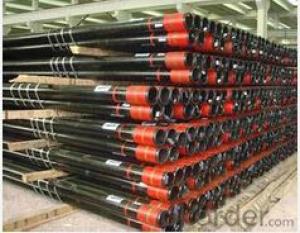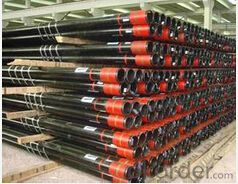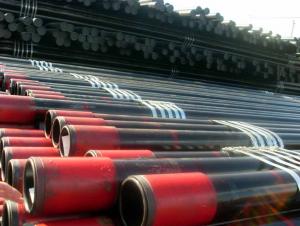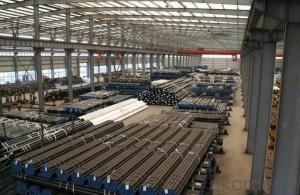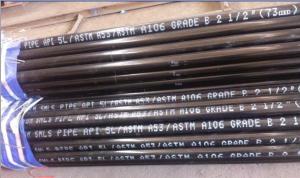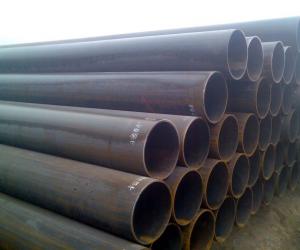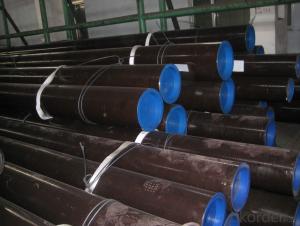seamless carbon steel pipe API 5CT oil casing tube
- Loading Port:
- Tianjin
- Payment Terms:
- TT OR LC
- Min Order Qty:
- 25 m.t.
- Supply Capability:
- 60000 m.t./month
OKorder Service Pledge
OKorder Financial Service
You Might Also Like
Specifications
Oil Casing Steel Pipe
1.Steel grade: J55 K55 N80-1 N80-Q L80 P110 ;
2.Size: Tubing 2 3/8" - 4 1/2" ;
3.length:R1,R2,R3 .
Technical data
Outsider Diameter | Wall Thickness | Grade | Thread | ||
Inch | mm | kg/m | 1b/ft | J55/K55/N80/L80/P110 | STC/LTC/BTC |
4 1/2” | 114.3 | 14.14-22.47 | 9.50-15.10 | J55/K55/N80/L80/P110 | STC/LTC/BTC |
5” | 127 | 17.11-35.86 | 11.50-24.10 | J55/K55/N80/L80/P110 | STC/LTC/BTC |
5 1/2” | 139.7 | 20.83-64.14 | 14.00-43.10 | J55/K55/N80/L80/P110 | STC/LTC/BTC |
6 5/8” | 168.28 | 29.76-47.62 | 20.00-32.00 | J55/K55/N80/L80/P110 | STC/LTC/BTC |
7” | 177.8 | 25.30-84.98 | 17.00-57.10 | J55/K55/N80/L80/P110 | STC/LTC/BTC |
7 5/8” | 193.68 | 35.72-82.30 | 24.00-55.30 | J55/K55/N80/L80/P110 | STC/LTC/BTC |
8 5/8” | 219.08 | 35.72-72.92 | 24.00-49.00 | J55/K55/N80/L80/P110 | STC/LTC/BTC |
9 5/8” | 244.48 | 48.07-112.51 | 32.30-75.60 | J55/K55/N80/L80/P110 | STC/LTC/BTC |
10 3/4” | 273.05 | 48.74-126.94 | 32.75-85.30 | J55/K55/N80/L80/P110 | STC/LTC/BTC |
11 3/4” | 298.45 | 6250-105.66 | 42.0-71.00 | J55/K55/N80/L80/P110 | STC/LTC/BTC |
13 3/8” | 339.73 | 71.43-107.15 | 48.00-72.00 | J55/K55/N80/L80/P110 | STC/LTC/BTC |
16” | 406.40 | 96.73-162.21 | 65.00-109.00 | J55/K55/N80/L80/P110 | STC/LTC/BTC |
18 5/8” | 473.08 | 130.22 | 87.50 | J55/K55/N80/L80/P110 | STC/LTC/BTC |
20” | 508.00 | 139.89-197.93 | 94.00-133.00 | J55/K55/N80/L80/P110 | STC/LTC/BTC |
API Oil Casing Pipe can be used for oil pipeline, oil natural gas, industrial gas, water transportation etc.
Packing Details:
Single with bubble bag and then in wooden case(fumigation certificate). Each case is clearly marked with:
1.Name & identification mark of manufacturer-HuaDong Brand
2. Batch number
3. Date of manufacturer
4. Material
5. Safe heating & application temperature
- Q: Does the seamless steel pipe need rust removal?
- Spray (throw) shoot derusting by the high-power motor to drive the spray shot (impeller) blade rotating speed, the steel grit, steel shot, iron wire, minerals and other abrasive jet for 20# seamless steel tube surface under the action of centrifugal force (left) radiation treatment, not only can completely remove the dirt and rust, oxide, and the role of 20# seamless steel in abrasive blast and friction force, can achieve the required uniform roughness.Not only can the physical adsorption effect on the surface of the pipe be increased, but also the mechanical adhesion of the anticorrosive layer to the pipe surface can be enhanced. Therefore, spraying (throwing) shot derusting is an ideal method of rust prevention for pipeline corrosion protection. Generally speaking, shot peening (sand) derusting is mainly used in the inner surface treatment of tubes, shot blasting (sand) derusting is mainly used for the outer surface treatment of tubes.
- Q: Can steel pipes be used for chemical refineries?
- Yes, steel pipes can be used for chemical refineries. Steel pipes are commonly used in chemical refineries due to their high strength, durability, and resistance to corrosion. The harsh environment of a chemical refinery, which involves exposure to corrosive chemicals and extreme temperatures, requires materials that can withstand these conditions. Steel pipes are able to handle these challenges and are often chosen for their ability to transport various fluids and gases safely and efficiently. Additionally, steel pipes can be welded, which allows for easy installation and maintenance in complex refinery systems. Overall, steel pipes are a suitable choice for chemical refineries due to their robustness, corrosion resistance, and compatibility with the demanding conditions of this industry.
- Q: How do steel pipes compare to other materials like PVC or copper pipes?
- Steel pipes have numerous advantages over materials such as PVC or copper pipes. Firstly, their strength and durability make them ideal for high-pressure applications. They can withstand extreme temperatures and resist corrosion, making them suitable for both indoor and outdoor use. In contrast, PVC pipes are weaker and more prone to cracking and breaking under pressure or in extreme temperatures. Although copper pipes are durable, they can be susceptible to corrosion and may require additional protective coatings. Secondly, steel pipes have a longer lifespan compared to PVC or copper pipes. They are renowned for their longevity and can last for several decades without needing replacement. PVC pipes, although relatively inexpensive, have a shorter lifespan and may require more frequent replacement. Similarly, copper pipes can corrode over time and may need maintenance or replacement. Another advantage of steel pipes is their ability to handle a wide range of fluids and substances. They are commonly used in industrial applications where chemicals or corrosive materials may be present. PVC pipes, on the other hand, may not be suitable for handling certain chemicals or substances as they can react and cause damage to the pipe. Copper pipes, while generally safe for carrying water, may not be ideal for conveying certain chemicals or fluids. Additionally, steel pipes possess excellent fire resistance properties. In the event of a fire, they can withstand high temperatures and maintain their structural integrity, ensuring the safety and protection of the surrounding area. PVC pipes, however, can melt or deform under high heat, potentially causing structural damage. Although copper pipes are less prone to melting, they can still be affected by extreme heat and lose their strength. Nevertheless, steel pipes do have a few drawbacks. They tend to be heavier and more challenging to install compared to PVC or copper pipes. Additionally, they can be more expensive upfront, especially when compared to PVC pipes. However, considering their durability and longevity, steel pipes may offer better value in the long run. In conclusion, steel pipes provide numerous advantages over materials like PVC or copper pipes. They are strong, durable, resistant to corrosion, and have a longer lifespan. They can handle high-pressure applications and a wide range of fluids, making them suitable for various industrial and commercial uses. Although they may be more expensive and difficult to install, the benefits of steel pipes make them a reliable and cost-effective choice for many applications.
- Q: How are steel pipes tested for strength and durability?
- Steel pipes are typically tested for strength and durability through various methods, including non-destructive testing techniques such as ultrasonic testing, magnetic particle inspection, and visual inspection. These tests help identify any potential defects, cracks, or flaws in the pipes. Additionally, destructive tests like tensile testing and impact testing are conducted to measure the strength and toughness of the steel pipes. These rigorous testing procedures ensure that the pipes meet the required standards and can withstand the intended applications.
- Q: Are steel pipes affected by magnetic fields?
- Indeed, magnetic fields can have an impact on steel pipes. Steel, being a ferromagnetic material, is strongly attracted to magnets and can be magnetized. When exposed to a magnetic field, steel pipes can become magnetized themselves, exhibiting magnetic behavior. This magnetic phenomenon can have several implications. Firstly, when steel pipes are in proximity to robust magnetic fields, like those generated by electrical currents or powerful magnets, they may experience a force that could cause them to move or vibrate. This can pose challenges in certain applications, particularly if the pipes need to remain stable and secure. Secondly, the presence of magnetic fields can induce electrical currents in steel pipes. These currents, known as eddy currents, can result in heat generation and energy losses. In some instances, this can lead to inefficiencies and increased energy consumption in systems involving steel pipes. Lastly, magnetic fields can also influence the accuracy of magnetic measurement devices utilized to identify defects or corrosion in steel pipes. The presence of a magnetic field can interfere with the readings, making it more difficult to precisely assess the condition of the pipes. To mitigate these effects, various measures can be implemented. For example, in applications where stability is of utmost importance, steel pipes can be shielded or isolated from strong magnetic fields using non-magnetic materials. Additionally, the impact of eddy currents can be minimized by employing pipes with proper insulation or by utilizing magnetic shielding techniques. In conclusion, while magnetic fields do affect steel pipes, the extent of the impact depends on factors such as the strength of the magnetic field, the composition of the steel, and the specific application or environment in which the pipes are utilized.
- Q: How are steel pipes sized and classified?
- Steel pipes are sized and classified based on their outer diameter, wall thickness, and length. The sizing is done using standard measurements such as nominal pipe size (NPS) or nominal diameter (DN). Classification is determined by factors such as the pipe's pressure rating, material composition, and intended use. This helps ensure compatibility and proper installation in various applications such as plumbing, construction, and industrial processes.
- Q: What steel pipes are buried for outdoor heating pipes? Seamless or welded tube? Are there any rules for specific countries? Can use the seamed tube?
- Screw on the line, mainly anti-corrosion and insulation, seamless pipe caliber restrictions, so the price is high, with the most affordable screw can meet the requirements, 377 and 273 of the spiral 3920 yuan / ton, straight seam is about 4350
- Q: Is the electric pipe used with steel pipe or PVC pipe?
- Electric pipe laying is generally divided into the following circumstances:1) the explosion-proof area must be galvanized steel pipe and explosion proof flexible pipe (used for front end equipment connection);2) non explosion-proof area can use KBG pipe or PVC tube, the former is higher cost, but the installation is firm, the latter is low cost, easy to construction, and in the rain where it will not rust, but compared to the KBG pipe may be damaged.
- Q: How are steel pipes used in underground drainage systems?
- Steel pipes are commonly used in underground drainage systems due to their durability and strength. They are used to transport wastewater, stormwater, and other liquids away from buildings and infrastructure to a designated discharge point. The steel pipes provide a reliable and long-lasting solution, ensuring the efficient flow of water and preventing any potential leaks or damage to the surrounding environment.
- Q: How are steel pipes insulated to prevent heat loss?
- Steel pipes are typically insulated to prevent heat loss by wrapping them with insulation materials such as mineral wool, fiberglass, or foam. These insulation materials provide a barrier that traps heat within the pipes, preventing it from being lost to the surrounding environment. Additionally, pipes may also be covered with an outer protective layer, such as aluminum or PVC, to further enhance insulation and protect against external elements.
Send your message to us
seamless carbon steel pipe API 5CT oil casing tube
- Loading Port:
- Tianjin
- Payment Terms:
- TT OR LC
- Min Order Qty:
- 25 m.t.
- Supply Capability:
- 60000 m.t./month
OKorder Service Pledge
OKorder Financial Service
Similar products
Hot products
Hot Searches
Related keywords
